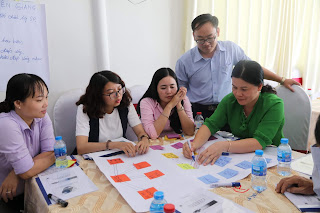Thirty five participants were trained on best practices for (a) water management, (b) postharvest and life cycle assessment, and (c) rodents and golden apple snail management. They also received lectures and exercises to enhance their capacity to train farmers using effective materials that will help improve the implementation of the nationally-supported technology, 1 Must Do, 5 reductions (1M5R).
According to Dr. Alexander Stuart, IRRI crop management and ecology scientist, 1M5R is a package of best management practices that is also being promoted by the project “Closing Rice Yield Gaps in Asia with Reduced Environmental Footprints” (CORIGAP). The focus of 1M5R is to use certified seeds (1 must do) and to reduce seed rates, nitrogen fertilizer inputs, pesticide use, water use, and post-harvest losses (5 reductions) to optimize rice productivity and to reduce the negative environmental impact of rice production.”
A field tour was also organized to demonstrate the application of 1M5R in the field and learn about alternate wetting and drying technology (AWD) to reduce water use. Participants interacted with farmers who are implementing 1M5R to discuss the benefits and constraints of the technology from the farmers’ perspective.
Mr. Tran Huu Hung, a farmer from Thoai Son district, has been farming for 22 years. During the current season, he allotted his two hectare farm following the 1M5R promoted under the VnSAT project. He attended training sessions of 1M5R and has been self-evaluating different components of the technology in his field, such as AWD. “I have been using the AWD for 10 seasons now and I am able to use water more efficiently. I have signed up to the 1M5R training courses and have been constantly learning. I find out from our extension worker what the recommended practices are and assess how these can be adapted for my field,” he said.
As a next step to accelerate the adoption of 1M5R, a Learning Alliance workshop was conducted to understand how PPMUs, farmers and other stakeholders can work together to provide supporting mechanisms to enable farmers to sustainably produce rice and gain market incentives from it. About 40 participants attended the LA meeting where private sectors, traders, and exporters also attended to develop a road map for the Learning Alliance group that will be established in two provinces.
The training activities were led by IRRI Scientists Alex Stuart, Nguyen Van Hung, Nguyen Thi My Phung, and Reianne Quilloy.



No comments:
Post a Comment